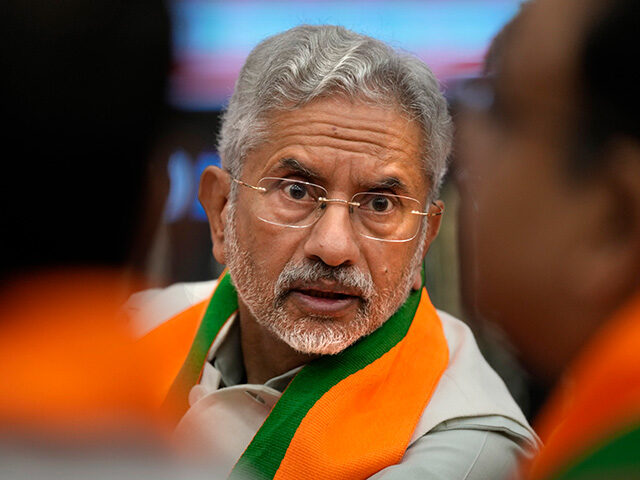India’s top diplomat, External Affairs Minister S. Jaishankar, told reporters on Friday that China’s repeated incursions across the border into India make trade with the Communist Party regime difficult, asking, “Would you do business with somebody who had just barged into your drawing room and is trying to make a mess of your house?”
Jaishankar was speaking at the Confederation of Indian Industry (CII) annual business summit, where he used most of his remarks to encourage Indian businessmen to invest domestically and expressed a willingness by the government of Hindu nationalist Prime Minister Narendra Modi to compete in industries where China has carved out a significant portion of the market, including “semiconductors, electric vehicles, batteries, green and clean technologies, drones and space.”
While his initial remarks emphasized growing India’s economy rather than competing with China, Jaishankar responded to questions specifically about China with concerns about “national security” and references to ongoing disputes between the two countries.
According to the Times of India, Jaishankar was discussing the issue of foreign terrorism – typically a bigger concern for India with regard to neighboring Pakistan, but fielded a question about how border disputes between India and China impact economic ties. Jaishankar said the relationship with China was “more complex” than New Delhi’s hostility toward Pakistan, but suggested the Indian-Chinese relationship was not ripe for economic cooperation.
“Would you do business with somebody who had just barged into your drawing room and is trying to make a mess of your house? there is a common sense proposition here,” Jaishankar said.
China and India have for years disputed the location of the “Line of Actual Control” (LAC), their mutual border in the Himalayan mountains. Those disputes turned violent in 2020, when Chinese People’s Liberation Army (PLA) crossed into India’s Ladakh region and reportedly erected tents without permission. When Indian soldiers approached their PLA counterparts, the Chinese soldiers attacked, prompting a gruesome brawl fought with rocks, clubs, and other rudimentary weapons. Many soldiers reportedly died of hypothermia or fell off cliffs in the difficult mountain terrain. Both the Indian and Chinese sides claimed to win the Galwan Valley battle; Indian officials reported killing twice as many Chinese soldiers as the troops they lost despite being “badly outnumbered.”
Prior to 2020, the rules of engagement along the LAC forbade carrying firearms. The Galwan Valley battle changed those rules, resulting in other skirmishes later that year in which the first shots were fired across the border in 45 years.
India has since announced an unprecedented deployment of troops to the Chinese border and took control of formerly Chinese-controlled mountaintops along Pangong Tso, a lake in occupied Tibet.
In response, last year, China published a new “standard map” of China that included substantial portions of Indian territory, in addition to the entirety of the nation of Taiwan and South China Sea territory belonging to at least four other countries. China claimed the entire Indian state of Arunachal Pradesh and portions of Ladakh, renaming them as “South Tibet.” The Communist Party has also renamed occupied Tibet with the Mandarin name “Xizang,” intending to erase the indigenous culture of the region.
At the time, Jaishankar scoffed at the map.
“China has put out maps with territories not theirs. Old habit,” the foreign minister told India’s NDTV. “Putting out maps with parts in India doesn’t change anything. Our government is very clear about territory. Making absurd claims does not make other people’s territories yours.”
Despite this unresolved dispute, the Hindustan Times noted on Friday that China became India’s top trade partner, beating out America, in the 2023 fiscal year, “with two-way trade worth $118.4 billion. India’s exports to China during this period were worth only $16.67 billion.”
Jaishankar urged Indian businesses on Friday not to move out of the country for cheaper opportunities, without mentioning China directly.
“We have a problem with the business community of India which is that businesses still is making choices based really on price point,” he said, according to the Times of India. “I understand the compulsion of business but in the long run, we will have to see how we encourage businesses to do much more domestic sourcing and for that, we need to see much more domestic production.”
On China specifically, he added, “Where China is concerned, we will still encourage people in this country to manufacture in India, source in India, procure from India, wherever possible, try to think long term … but we have not completely prohibited working with China.”
Jaishankar repeatedly warned of “over-concentration,” overproduction, and China’s monopoly on global supply chains in his speech preceding the question and answer session.
“There is a widespread realization of the dangers of over-concentration, be it in manufacturing or technology. We all saw for ourselves how our supply chains were disrupted,” the top diplomat said, referring to the Wuhan coronavirus pandemic and the Communist Party’s decision to lock down entire cities at a time in China. “This concern is now manifested in the endeavours to build more resilient and reliable supply chains, diversify centres of production and to the extent feasible, de-risk the global economy.”
Jaishankar also warned of “a combination of excessive market shares, financial domination and technology tracking.”
“Between them, they have actually allowed for the weaponization of virtually any form of economic activity,” he continued. “We have seen how both exports and imports, access to raw materials or even stability of tourism has been utilized to exert political pressure. At the same time, the power of currency and the threat of sanctions have been deployed in the toolbox of international diplomacy.”

COMMENTS
Please let us know if you're having issues with commenting.